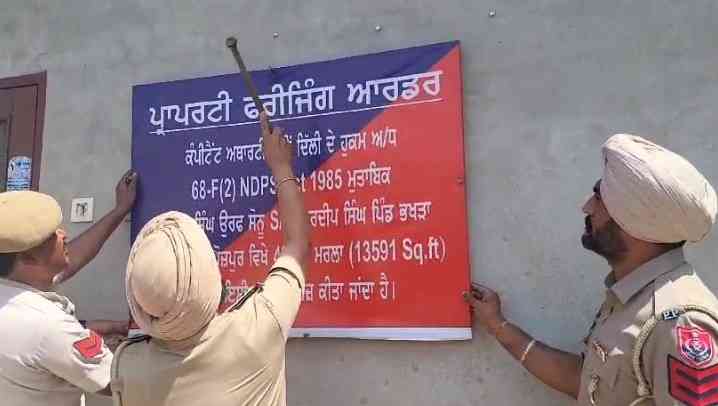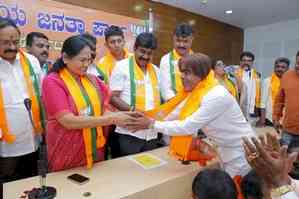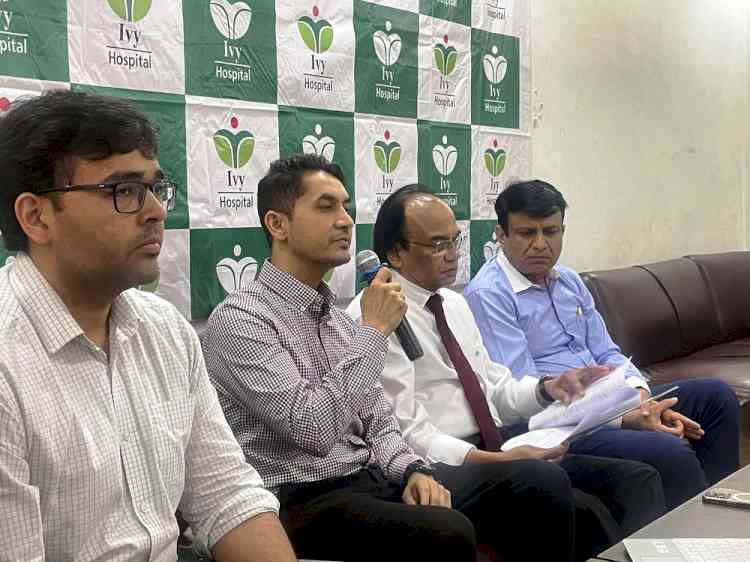Technology meets Healthcare at Medical Electronics Innovation Summit 2016
Author(s): City Air News (Left to Right):- Mr. Mehul Lanvers- Shah (Managing Director, Hannover Milano Fairs India Pvt. Ltd), Mrs. Sulabha Ranade (Director, SAMEER – R&D Institute under Meity, Dr. Omkar Rai (Director General, Software...


(Left to Right):- Mr. Mehul Lanvers- Shah (Managing Director, Hannover Milano Fairs India Pvt. Ltd), Mrs. Sulabha Ranade (Director, SAMEER – R&D Institute under Meity, Dr. Omkar Rai (Director General, Software Technology Parks Of India), Shri. P.P.Chaudhary (Minister Of State, Law & Justice and Ministry Of Electronics and Information Technology), Shri. Ravi Shankar Prasad (Minister Of Law & Justice and Ministry Of Electronics and Information Technology), Smt. Aruna Sundarajan (Secretary, Ministry Of Electronics and Information Technology), Smt. Poonam Malakondaiha (IAS Principal Secretary, Government Of Andhra Pradesh), Dr. Debashish Datta (Group Co-ordinator, Ministry Of Electronics and Information Technology).
photo: city air news
Mumbai, September 22, 2016: The Ministry of Electronics and Information Technology (MeitY) launched the first edition of the Medical Electronics Innovation Summit 2016 at IIT Powai in Mumbai on the 22nd September. The Summit was inaugurated by by Shri Ravi Shankar Prasad, Minister of Electronics and Information Technology, Government of India , Shri P.P.Chaudhary, Hon. Minister of State, Ministry of Electronics and Information Technology along with Sri Kamineni Srinivas, Hon. Minister for Health, Government of Andhra Pradesh. Also present at the inauguration were dignitaries such as Smt. Aruna Sundararajan, Secretary, Ministry of Electronics and Information Technology, Dr. Omkar Rai, Director-General, Software Technology Parks of India (STPI), Mr. Sivan Menon, Chief Technology Officer, GE Digital , Dr. Rajendra Patankar, M. D., Chief Operating Officer, Nanavati Hospital, Ms. Sulabha Ranade Director, SAMEER, etc and many more. The Summit was attended by medical directors, key decision makers, medical information officers, technology specialists, researchers etc from the healthcare sector.
A key highlight of the Summit was signing of an MOU Signing between SAMEER (Society for Applied, Electronics Engineering & Research) and the Government of Andhra Pradesh, on conducting joint and comprehensive assessment of health technologies as identified starting with Dual Energy Linear Accelerator for cancer care development. SAMEER is a research and development laboratory of the Ministry of Electronics and Information Technology, Government of India, mandated to contribute towards the growth of science and Technology of RF/Microwave electronics, Electromagnetic Interference/Compatibilty (EMI/EMC) and allied areas through intensive research, design, development and industrial applications.
With India’s medical electronics market growing to $11.7 billion by 2017, the Summit witnessed a panel discussion on the scope of Foreign Direct Investment (FDI) in the healthcare sector, especially with opening up of 100% FDI for manufacturing of Medical devices in India last year. Highlight of the day was a very interesting panel discussion on creating integrated healthcare model, wherein the key speakers spoke about integrating the entire eco-system of healthcare models in such a way so as to benefit the patients to get easier access to healthcare services, diagnosis, insurance claims etc. The integrated
healthcare model is an initiative by the Government of India to bring together all the aspects of the healthcare sector to improve the methodology of the system. Top professors, researchers and experts from various key institute and colleagues spoke about the process innovation in healthcare services – developing a sustainable model for accessible and affordable service through innovation. The day ended with power topic on Capacity Building and Infrastructure Management for technology driven medical electronics in India.
The Conference also presented 5 start-up companies from the healthcare sector pitching in their idea for it’s Start Up Pitch Deck to a 3-member jury panel which comprising of Mr. Aditya Nataraja, Manager, IIT Patna Incubation Center, Prof. Milind Atre, SINE, IIT Bombay and Mr. Neel Bhatia, Director – Innovation and IP Ecosystem Development, Intel Technology India. The results for the presentations would be out on the second day of the Summit i.e., 23rd September 2016.
The Medical Electronics Innovation Summit 2016 is an excellent platform to showcase and discuss various ideas to improve the healthcare system and increase accessibility to medical devices in the country. With the increased awareness for healthcare system among the masses, the Government of India is taking appropriate steps for the improvement the sector.
Speech by Shri Ravi Shankar Prasad At Medical Electronics Innovation Summit 2016, Mumbai
Medical devices are increasingly becoming medical electronics. From commonly-used medical devices like thermometers, stethoscopes, blood pressure instruments to high-end devices are all becoming electronics. According to an estimate, the demand for medical electronics devices was around USD 1 Bn in 2012 and is expected to reach USD 6.5 Bn by 2020. Our global share is only 2% and in the coming years, there will be greater demand for medical electronics in the country for the following reasons:
• Greater awareness and increasing incomes leading to demand for new hospitals and number of beds, doctors and nurses
• Increasing use of technology (Telemedicine, Personal devices, Mobile based technologies, Imaging, Interventional)
• Imaging, Cardiology equipment restricted to larger hospitals
• Government programmes like NRHM providing technology at grassroots
Government provides medical electronics devices the same financial incentives for medical electronics devices which it provides for development of IT and telecom equipment. As a result, incentives like Modified SIPS, Electronic Manufacturing Clusters, EDF are available for the units investing in medical electronics devices. A major step taken by our Government was to allow 100% FDI through automatic route for manufacture of medical devices as early as January 2015. As a result of the incentives being offered by Government, several domestic and multinational companies have started their manufacturing activities in the country. These include GE, Philips, Wipro GE, Trivitron among others. (We have received 7 proposals involving Rs 754 cr under MSIPS for medical electronics). However, when compared this investment with overall investment attracted under electronics manufacturing in other sectors like mobile manufacturing, LED, consumer electronics etc, this sector require more efforts.
Make in India promotes not only manufacturing for domestic needs but also for global demand. Companies should take advantage of the incentives offered under MEIS scheme to export medical devices manufactured from India and Health Sector Skills Council to take advantage of this scheme for developing skilled manpower in the area of advanced medical electronics devices. Presently, the penetration of medical devices in India is very low, therefore, the government encourages the businesses, R&D institutions and academia to use innovation and new technology to bring down costs of technology and make it more accessible. Start Up India is a programme which encourages such innovation. MeitY, SAMEER and CDAC have also taken steps which will stimulate innovation in this sector. CDAC Trivandrum had developed a programmable digital hearing aid which could be offered at nearly one-tenth of market price (USD 100 as against USD 1000 in market) in 2012. Similarly, SAMEER Mumbai had developed a Linear Accelerator for radiation treatment of cancer patients. A Microwave Disinfectant has also been developed by SAMEER Mumabi. Medical electronics industry is undergoing transformation with the advent of Internet of Things. Wearables are emerging one of the fastest growing medical device segment. To support this effort, MeitY has, along with Nasscom, set up a Centre of Excellence at Bengaluru to provide an ecosystem of support for start-ups. One of the biggest concerns in medical electronics industry is the threat of cyber security. This area has been attracting the attention of global industry and turned out to be an opportunity for startups.

 cityairnews
cityairnews 















